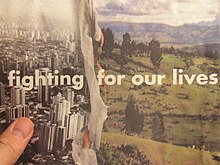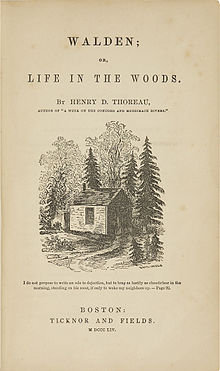Anarcho-primitivism
![]()
This article is about the political and philosophical current; for the art movement, see Primitivism (art); for the school of antiquity, see Primitivism (antiquity).
Primitivism refers to a political and philosophical current that strives for a social return to pre-industrial and often even pre-agricultural living and production conditions. Predecessors of primitivism in the history of ideas are above all various anarchist currents. It is often considered as such itself and therefore also called anarcho-primitivism. Primitivism is sometimes considered a subcurrent of eco-anarchism.
In primitivism, beliefs that are taken for granted by most other political currents are questioned ideologically. Technological progress" was not "progressive", but had increasingly negative effects on people (e.g. alienation). The development of modern technologies through large-scale organizational structures since the industrial revolution has been particularly devastating. But even the previous change in society since the end of hunter-gatherer life (→ Neolithic Revolution) is viewed critically by most primitivists - and thus any form of civilization.
Some theorists argue that anarcho-primitivism has existed consistently as a political ideology for so long that there is now a dissatisfaction with civilization across all cultures and generations, as well as a desire to "return" to nature. They additionally argue that the widening gap between civilization and nature also reinforces people's desire to destroy civilization and also affirms the continued relevance of anarcho-primitivist thought.
Many convinced primitivists live a minimalist simple life. Some withdraw from modern civilization as dropouts, alone or with others as a commune, as far as possible. Others become active and spread primitivist ideas in society or violently try to bring about a revolution to destroy the industrial system and its modern technology, such as the US terrorist Theodore Kaczynski, who became known as the "Unabomber".

English-language slogan in an anarcho-primitivist magazine portraying modern civilization as dangerous.

Black and green flag of anarcho-primitivism (see also Anarchist symbolism.)
Difference from traditional anarchism
Anarchists pursue strictly anti-authoritarian goals, thus fundamentally questioning any form of power of humans over other humans and striving instead for egalitarian relationships and communities based on mutual aid. Primitivists extend these ideas of traditional anarchists that are critical of domination to all life, thus relating them not only to human life, and thus engage in a more comprehensive analysis of power structures than traditional anarchists. Moreover, the primitivist focus of social critique is clearly more on the critique of technical progress as well as civilization in general.
Many classical anarchists reject this critique of civilization, while some, like Wolfi Landstreicher, approve of the critique without considering themselves anarcho-primitivists. Anarcho-primitivists can also be distinguished from other anarchists by their focus on the practice of trying to achieve a "dedomesticated" state through "renaturalization" (English "rewilding").
History
Primitivism arose from various anarchist currents. However, similar convictions were found much earlier, e.g. among the Cynics in ancient Greece, the Daoist Chinese philosopher Zhuangzi, medieval monasticism, the Anabaptists and the romantic transfigurers of the Noble Savage.
Origins
In the United States, anarchism was first enriched with an ecological perspective through the writings of Henry David Thoreau. In his book Walden, Thoreau advocates simple living and self-sufficiency amidst a natural environment as a means of resisting advancing industrial civilization. "Many saw Thoreau as one of the pioneers of ecologism and anarcho-primitivism as advocated today by John Zerzan. According to George Woodcock, this attitude can also be motivated by the idea of resistance to progress as well as rejection of the increasing materialism that characterized North American society in the mid-19th century." Zerzan himself added Thoreau's Excursions (1863) to his revised 1999 collection of anti-civilization writings Against Civilization: Readings and Reflections.
In the late 19th century, anarchist naturism (also anarcho-naturism) first appeared as a combination of anarchist and naturist philosophies. This was mainly important within individual anarchist circles in Spain, France and Portugal. Important influences for anarcho-naturism were Henry David Thoreau, Lev Tolstoy, and Élisée Reclus. Anarcho-Naturism advocated vegetarianism, free love, free-body culture, eco-settlements, and a generally ecological worldview within anarchist groups as well as outside. Anarcho-Naturism promoted these ideas, especially free-body culture, to counter the artificiality of the industrial mass society of modernity.
Naturist individual anarchists saw the individual in its biological, physical and psychological aspects, avoided social distinctions and sought to abolish them. Their ideas played an important role in individual anarchist circles, especially in France, but also in Spain, where Federico Urales (pseudonym of Joan Montseny) championed the ideas of Gravelle and Zisly in La Revista Blanca (1898-1905). This current was strong enough to attract the attention of the CNT/FAI in Spain. Daniel Guérin, in Anarchism: From Theory to Practice, reported how "Spanish anarcho-syndicalism was long concerned to ensure the autonomy of what they called "reference groups." There were many naturism and vegetarianism experts among their members, especially among the poor peasants of the South. Both lifestyles were seen as suitable for the transformation of man towards a stateless society. At the Zaragoza Congress, members did not forget the fate of the naturist and nudist groups, who are "unfit for industrialization." Since it would not be possible for these groups to provide for all their own needs, the Congress expected that their delegates to the meetings of the Confederation of Communes would be able to negotiate special economic arrangements with the other agricultural and industrial communes. On the verge of a vast, bloody social transformation, the CNT did not think it unwise to try to satisfy the infinitely different expectations of individual people."
In its anti-technological orientation, primitivism is also inspired, among other things, by Luddism in England at the beginning of the 19th century. In the English-speaking world, primitivists are therefore often referred to (sometimes pejoratively) as "neo-Luddites"; sometimes even today (usually pejoratively) simply as "Luddites".
Current discourse
Some primitivists, with the help of the scientific knowledge of anthropology, research the emergence of civilization in order to better understand their "adversary" and the emergence of contemporary society so that they can initiate a thoughtful change of direction. Primitivist insurrectionism, on the other hand, does not want to wait for the "fine-tuning" of critique and instead already attacks the current institutions of civilization with spontaneous attacks.
Current primitivist discourse is inspired by the following ideas and currents, among others:
- Situationism and its critique of the society of the spectacle and alienation through a society based on consumer goods.
- Deep Ecology and its recognition that the well-being of all life is linked to an awareness of the inherent value of the non-human world, regardless of its economic value. Primitivists believe that appreciation of the richness and diversity of life helps to recognize current human encroachment on the world as brutal and disproportionate.
- Bioregionalism and its idea of living completely within one's own bioregion and establishing an intimate connection with the land, water, climate, plants, animals, etc. of the same.
- Indigenous culture. Some primitivists seek to learn sustainable survival techniques from indigenous people, as well as healthier ways to interact with diverse life forms. Some are also inspired by the Australian subculture of feral, in which people abandon domestic life and reintegrate into the wilderness.

Cover of the original 1854 edition of Walden by Henry David Thoreau.
Search within the encyclopedia